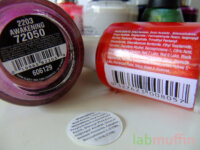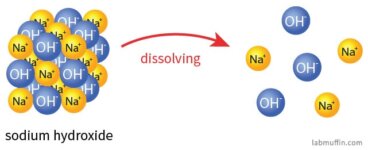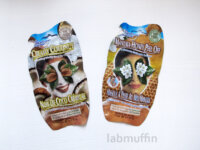One of my friends recently asked me why you can’t solely use oil for cleaning your face. The answer is quite simple – water doesn’t dissolve oil, so you need something that does.
If you’ve been on this planet for more than 10 years, you should have noticed by now that oil and water don’t mix (if you haven’t, please go to your kitchen and pour some oil into a glass of water IMMEDIATELY. Then come back and read the rest!).
The reason for this is that there are two basic categories of chemical – polar and non-polar. Polar things mix together, and non-polar things mix together. Water, salt, sugar and vinegar are examples of things that are polar, while oils, fats, butters, grease and turpentine are non-polar. Some things, such as acetone, can mix with both categories.
Soapy cleansers can also mix with both polar and non-polar substances – they’re a special kind of chemical called surfactants. These have a polar “head” (purple circle) and a non-polar “tail” (zig zag).
Sodium lauryl sulfate is an example:
This makes them special because they can help the oil come off into water, and we use them all the time – dishwashing detergent helps cooking oil come off, shampoo cleans grease from hair. The soap surrounds the oil in little drops called micelles, with the non-polar bit sticking in (with the oil) and the polar part sticking out (with the water), so everything’s happy hanging out together.
This is what happens as you wash your face using the OCM (click for larger):
So if you stop after rinsing your face with water (picture 4) then your face will be covered in oil and make up gunk and dirt. Of course, if you just leave your skin clean like in the last step, there isn’t any oil on top to protect it, so it’s always a good idea to moisturise with some clean oil or lotion to seal in moisture after cleaning.










I love the little pictures 🙂
wow! just like to say, i just joined your site,after seeing it featured on thebeautybrains! i must say, i find these science-related posts so interesting, especially since this has been what i’ve been learning about in my chemistry classes recently and having a love for it too! thank you very much for your awesome posts, i look forward to seeing more, especially the scienc-ey ones! 🙂
Interesting, but what happens when you use alcohol wipes instead of soap?
Alcohol is similar in that it helps oil dissolve in water – importantly, the wiping action basically scrapes off the top layer of whatever’s on your skin (makeup, top oily layer of skin).
Thanks for the response – I love your blog btw!
“… so everything’s happy hanging out together”
Ha, great 😀 !
it sounds very logical and all but I’ve been using OCM for the past 6 months and it has never been better 🙂 I had some skin problems and I was looking for some “natural” or generally gentle ways to wash it – at first I found a very simple soap (just like 3 or 4 ingredients) and it was ok, but then I tried OCM and it was like magic 😉 I have to use some oil or a moisturizer afterwards because my skin is kind of try after I cleanse it but now it makes me wonder – why did it work? it should make my face totally clogged and unhappy 😉 or is the cloth I use with my oils enough to take all the dirt from my face?
Haha, the little faces are so cute! Splash splash, rub rub, lol! 🙂
In the picture showing your washing routine, the procedure is, if I understand correctly, water – oil – micellar water (surfactants).
If that is the case, why do you use oil before the micellar water, in order to attract the remaining oil on the surface and in the pores?
I suppose that would make sense, but then my question is this: does micellar water alone not do good enough a job? I have dry to normal skin and don’t wear heavy make up, but would of course like to remove all the city grime thoroughly at the end of the day. Should I incoporate oil?
And if so, what oil-based cleanser (or oil) do you recommend?
Thanks!
This is for oil cleansing – where people use oil to clean their face, which needs to be followed up with a second cleanser to get the dirty oil off 🙂 Generally a cleanser or micellar water should be enough, but for some people who wear heavy makeup or sunscreen during the day they might need a second cleanser, which is where oil comes in handy.